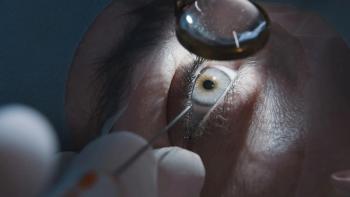
Prevent Blindness voices support for reintroduction of EDVI Act
The Early Detection of Vision Impairments for Children Act (EDVI), or HR 2527, would allow the federal government to award grants and cooperative agreements to eligible states and communities for children's vision care initiatives.
Prevent Blindness has vocalized its full support of the recent reintroduction of the Early Detection of Vision Impairments for Children Act (EDVI), or HR 2527, in the US House of Representatives.1 The bipartisan legislation would work to establish grants for states and communities to apply for and access for the implementation of new approaches and improved public education regarding children’s vision, early detection of vision concerns, referrals for eye examinations, and follow-up mechanisms, among other initiatives, according to the release.
“Far too many children in the United States face unnecessary barriers to essential vision care,” said Jeff Todd, president and CEO of Prevent Blindness, in the release. “The EDVI Act brings us closer to a future where every child has access to the vision screenings, eye exams, and treatment they need to see clearly and thrive. We are proud to support this critical legislation that prioritizes children's eye health and educational success.”
The EDVI Act was first introduced in the House in May 2024 and was reintroduced on March 31, 2025. The bill has maintained the same cosponsors in the Congressional Vision Caucus cochairs, Rep Gus Bilirakis (FL-12), and Rep Marc Veasey (TX-33). Companion legislation to the bill is expected to be introduced in the US Senate in the near future.1 Dozens of public health organizations have also voiced their support for the EVDI Act, including the American Optometric Association, the American Academy of Optometry and Ophthalmology, Lighthouse Guild, The Vision Council, World Council of Optometry, and many others.2
If passed, the EDVI Act would allow the US Department of Health and Human Services’ Health Resources and Services Administration to award grants and cooperative agreements to eligible states and communities.1 The act would also work to “establish a coordinated public health system for vision health and eye care diagnosis and treatment, develop state-based data collection and performance improvement systems, and promote wrap-around services for children who experience vision loss,” according to the release.
“As an American who has suffered from poor vision since childhood, I have a firsthand understanding of how critical early detection and treatment is when it comes to ensuring that all children have the best possible start in life,” said Bilirakis in the release. “The EDVI Act, reintroduced this year, will ensure all children get the screening and care they need at the right age by creating the first-ever federally funded program to address children’s vision and eye health. This legislation will empower states and communities, like mine, to improve systems of care for our youngest citizens and their families.”
The EVDI Act would also provide resources through the Centers of Disease Control and Prevention for technical assistance and guidance for new children’s vision systems of care, in addition to aiding the conducting of research. Current resources to provide information to help legislators and advocates further the act include Prevent Blindness’
“When I was in elementary school, I struggled to see the board, and it made learning incredibly difficult. It wasn’t until I had a vision screening and got the right pair of glasses that everything changed for me,” said Veasey in the release. “I know from personal experience that vision issues can hold a child back, and how something as simple as a pair of glasses can unlock their potential. No child should fall behind simply because they can’t see. With the reintroduction of The Early Detection of Vision Impairments for Children Act, we can all work together to ensure all children, in Texas and across the country, have access to the screenings they need to see clearly and reach their full potential.”
For those interested in the advocacy process, Prevent Blindness and the National Center for Children’s Vision and Eye Health at Prevent Blindness will be hosting a free
References:
Prevent Blindness applauds reintroduction of Early Detection of Vision Impairments for Children Act. News release. Prevent Blindness. May 6, 2025. Accessed May 6, 2025.
Early Detection of Vision Impairments for Children (EDVI) Act. Prevent Blindness. Accessed May 6, 2025.
https://advocacy.preventblindness.org/edvi-act-of-2024/
Newsletter
Want more insights like this? Subscribe to Optometry Times and get clinical pearls and practice tips delivered straight to your inbox.





